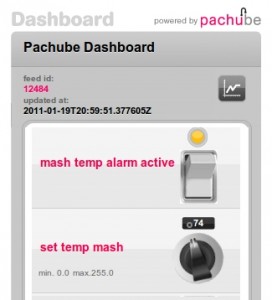I send a bunch of data from my sensor network _to_ pachube, but this post is about using pachube as a data _source_ They have this app called a dashboard, which basically gives you some knobs and switches, that are hooked up as live inputs to a pachube data stream.
So, that got me thinking, here was a process control GUI pretty much done for me. The permissions are a bit wonky, so I’ll only include a picture here, but basically I get a knob for a set temperature, and a button to turn an alarm on or off. (I can add lots more, but this is all I’ve got set up so far)

Neat, but now what? Well, the pachube api is pretty easy, so I just hooked up yet another consumer to my local network, (sensor data is dumped into a stomp/activemq message bus here, so that I can have infinite consumers of the data, without ever having to touch the code on my sensor nodes) that pulls data not just from the local network, but also from this pachube dashboard’s feed.
Add a little bit of pygame hackery so I can play sounds, and now I have a heating/cooling warning system for the kettle in the kitchen.
Example output
2011-01-22 11:05:08,649 INFO main - Current temp on probe is 31
2011-01-22 11:05:08,650 DEBUG main - threshold is 74, mode: heating
2011-01-22 11:05:08,650 INFO main - Turning music off.... we're below the threshold
2011-01-22 11:05:13,364 INFO main - Current temp on probe is 32
2011-01-22 11:05:13,365 DEBUG main - threshold is 74, mode: heating
2011-01-22 11:05:13,365 INFO main - Turning music off.... we're below the threshold
2011-01-22 11:07:01,408 INFO main - Current temp on probe is 33
2011-01-22 11:07:01,409 DEBUG main - threshold is 74, mode: heating
2011-01-22 11:07:01,409 INFO main - Turning music off.... we're below the threshold
2011-01-22 11:07:01,409 INFO main - Fetching current dashboard values from pachube, incase they've changed
This is far from any sort of automatic brewery, and was more an experiment in what was possible, and how easily. And it’s still a lot better than having me walk over to the kitchen every 5 minutes to check the current temperature. Now I can just turn the stove on, and get back to serious time wasting on the internet!
Source is over at github, https://github.com/karlp/karlnet/blob/master/consumers/pachube/consumer.pachube.dashboard.py
Things I found:
- Pachube dashboard only updates if you drag the knobs. Using direct entry doesn’t update the datastream
- Playing sounds from python is easy, but only when you find the right library, and only when you guess at the documentation a lot. I’ve no idea if this works on windows or osx. I tried a lot of other ways first, all of which failed miserably.
